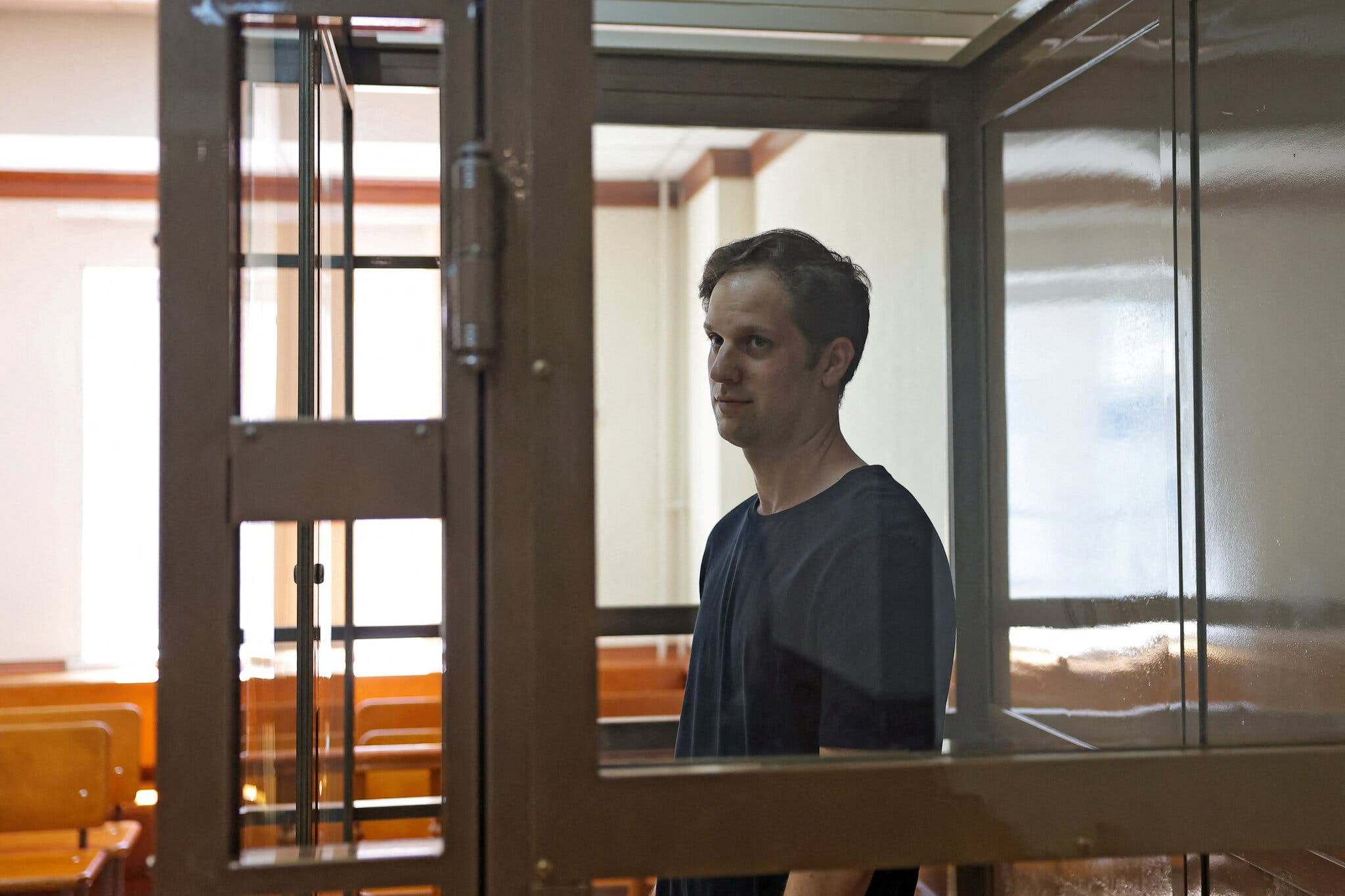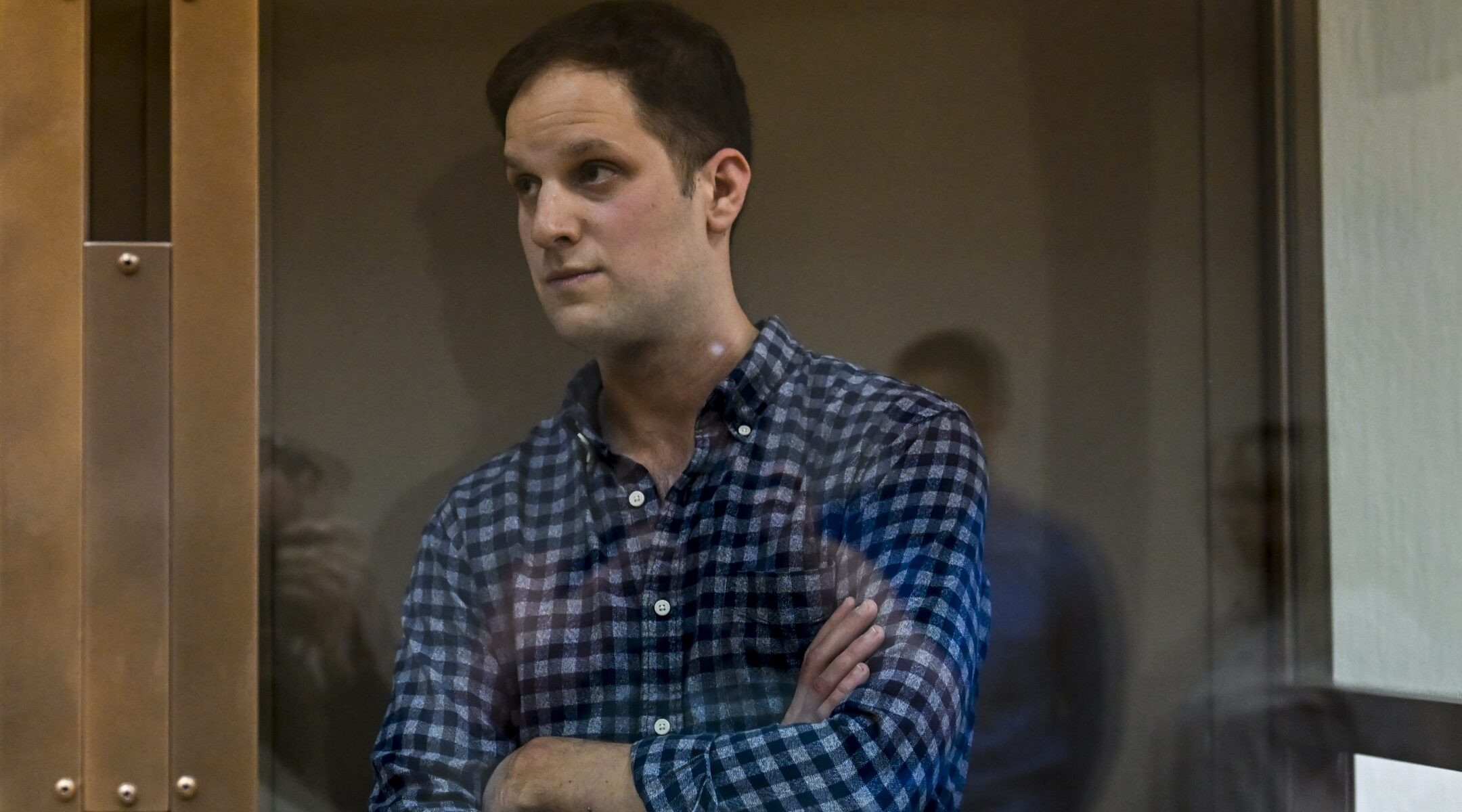When the opposition activist Ilya Yashin spoke after being freed from a Russian prison as part of the historic prisoner swap between Washington and Moscow, he said he had been warned never to return.
Speaking in Bonn, Germany, Yashin said that a Federal Security Service agent told him that if he came back from exile, his "days will end like Navalny's" — a reference to opposition figure Alexey Navalny, who died in an Arctic penal colony in February.
But as the experiences of Russian journalists and critics already in exile show, distance from Moscow is no assurance of safety.
Alesya Marokhovskaya fled Moscow for Prague shortly after Russia's full-scale invasion of Ukraine, thinking she would be safe in the Czech capital. Then the threats started.
Sent over the course of several months last year, the messages included detailed information about where they lived, their travel plans, and even that Marokhovskaya's dog had breathing problems.
"I was thinking I was safe here, and it was a big mistake for me because it's not true," Marokhovskaya told VOA. "It's hard not to be paranoid."
Even when Marokhovskaya moved to a new apartment, the assailants took notice.
"Rest assured, you can't hide from us anywhere," an August 2023 message, originally in Russian, said. "We'll find her wherever she walks her wheezing dog. None of you can hide anywhere now."
Russia's Foreign Ministry declined to answer specific questions about threats and harassment facing journalists. A spokesperson instead said "protecting the rights of journalists" is the ministry's "constant focus of attention."
The emailed response shared a list of instances in which foreign governments fined, banned or suspended Kremlin-run media. Russia's Prague embassy, meanwhile, did not reply to VOA's email requesting comment.
At first, Marokhovskaya thought the threats didn't impact her. But she later noticed changes in her lifestyle. She didn't leave her home as often, she said, and she worried about surveillance.
"Physically, I've never faced any aggression. It's just words for now, but it makes my life really messy," she said. "But only in a psychological way."
It's a sentiment shared by her colleagues at IStories and other exiled Russian journalists who spoke with VOA in Prague.
"Any journalist, whether he's working at IStories, or The Insider, or any other media outlet in exile, is, in a way, risking his or her life. You can't be 100% safe," IStories founder Roman Anin told VOA.
Restricted by Russian laws that effectively banned independent coverage of the war in Ukraine, hundreds of journalists — and their newsrooms — fled. Most resettled across Europe in cities like Amsterdam, Berlin, Riga, Vilnius, Tbilisi and Prague.
The legal aid group Setevye Svobody, or Net Freedoms Project, estimates that at least 1,000 journalists have left since the war broke out. Rights group OVD-Info estimates roughly the same number of political prisoners are held in Russian custody. Among that number, say watchdogs, are several journalists.
Had she stayed on Russian soil, Rita Loginova thinks she would have been among them. Originally from the Siberian city Novosibirsk, the journalist faced police harassment before fleeing in March 2023 on the encouragement of her editors.
"I didn't want to become a prisoner, because a mother near her children is better than a mother in prison. That's why I'm here," Loginova told VOA one evening at her favorite pizza place in Prague.
Between puffs on her vape and sips of beer, she spoke about leaving home "because we had a lot of risk for our life and our liberty," and how she misses her mom, her dog and the view from her old apartment.
Although she likes Prague, Loginova, who works at the independent outlet Verstka, says she is beset by financial hardship, a challenge experienced by many exiled Russians.
More broadly, reporting on Russia from abroad is a challenge, especially for outlets like IStories that have been branded "undesirable" organizations by the Kremlin — a designation that exposes staffers and sources to criminal charges and jail time.
As a result, says IStories founder Anin, finding sources in Russia willing to speak can be hard. And yet the exiled journalists know they are luckier than the political prisoners in Russia, let alone Ukrainians grappling with Russia's invasion firsthand.
"We have not an easy job, but simultaneously, we shouldn't complain," Anin said.
In June, Russia issued an arrest warrant for Anin on charges of spreading "false information" about the military, a charge the Kremlin often uses to retaliate against independent journalists or critics who speak out against the war.
"I was a little bit surprised why it took them so long to take this legal step," says Anin, who left Russia in 2021 for vacation but never returned after learning of his likely arrest.
Beyond legal threats and harassment, hacking is another problem.
Anna Ryzhkova, a journalist at Verstka, says that in December 2023, she received an email from someone posing as a journalist at another exiled Russian outlet, accusing her of plagiarism and asking her to click a link to the article in question.
Ryzhkova realized it was likely a scam designed to hack her accounts. She then learned several colleagues had received similar emails. Two months later, she discovered there had been a sophisticated attempt to hack her Gmail account.
"I was really frightened," Ryzhkova said, adding that she believes the Russian government was behind both incidents.
Sitting outside a stylish cafe playing Charli XCX music, Ryzhkova admits these incidents make her consider quitting journalism entirely.
"But then you take half a day off. You breathe," she said. "And you start again. You choose some dangerous topics again."
These cases show that nothing is out of bounds for Russia, according to Gulnoza Said of the U.S.-based Committee to Protect Journalists.
"Russia can do anything to silence government critics," she told VOA. "The challenges they face make it very difficult for them to stay mentally healthy and continue working as journalists."
There's a strange irony in being an exiled Russian journalist who fled your home to continue reporting on it. Moscow may be more than 1,000 miles from Prague, but it doesn't feel that far.
"Physically you're here, but mentally you're still in Russia, because you keep writing about Russia," Ryzhkova said, adding that sacrifice is a unifying factor for all who do it.
"We all miss our home," she said. "Most of us had to sacrifice something important to be here."
But for many, the often-personal costs are worth it.
"It's important to do this work. It's important," Alexey Levchenko, a journalist at The Insider, said at Prague's Cafe Slavia, a venue on the banks of the Vltava that has a history as a hub for writers.
"What can we do to stop the war? We don't have many possibilities," he said. "Journalism is one of the most effective possibilities."
Anin agreed. He views their work as integral to thwarting Moscow's effort to distort the truth about the war.
"We work 24/7," he said. "Even if you can't change the reality with your stories, we're saving the history for future generations."
Prague has a long history of literary dissidents, and these exiled Russian journalists are just the latest chapter.
Asked if she is happy, Ryzhkova is briefly caught off-guard. "I am," she says, before breaking into laughter.
Why the laughter? She tucks her blonde hair behind her ears before answering.
"If you had asked me the same question three years ago, when I lived in Moscow in my house, with my husband, with my dog, and if you had described to me everything that would happen to me over the next three years, I would say there is no way to stay happy in such circumstances," she says. "But somehow I am."
The recent release of the heroic Wall Street Journal reporter Evan Gershkovich from Russian detention raises to the forefront an infrequent but difficult challenge faced by chief executives of multinational enterprises: What to do about expatriate employees who are unjustly detained abroad? And does the company response really matter? And on both fronts, the record could not be clearer.
Companies That Stand by Their Employees
In Gershkovich’s case, his release was made possible in part by the unflagging loyalty of his employer, Dow Jones, who not only kept the unfortunate journalist’s plight in the news every day from the outset of his detention but also aggressively worked all and any levers they could find. In fact, Gershkovich’s employer even conspired with his family to circumvent the well-meaning but powerless mid-level government officials tasked with hostage recovery to get through directly to the highest levels, including confronting German Chancellor Olaf Scholz in person and cultivating Jake Sullivan, President Biden’s savvy, pragmatic, and powerful national security advisor, as a key ally.
More than 40 Americans remain unjustly abducted, detained, or held hostage abroad, 78% of whom are victims of wrongful detention by states such as China, Iran, and Russia. The leaders of Dow Jones were perhaps uniquely equipped to handle such a crisis. Wall Street Journal Editor-in-Chief Emma Tucker had previously championed the release of two of her journalists kidnapped in Syria in 2014 when she was then the deputy editor of The Times of London. Dow Jones CEO and Wall Street Journal Publisher Almar Latour had a desk four seats away from our mutual friend, WSJ journalist Danny Pearl, who was tragically beheaded by Islamist terrorists. It is hardly surprising such seasoned executives launched into action so quickly and strongly.
Companies That Abandoned Their Employees
Yet the simultaneous release of another of detained American, Paul Whelan, who served triple the time in Russian prison than Gershkovich, is a sad reminder that not all companies stand by their employees unjustly abducted abroad. Soon after Whelan’s release, his employer, BorgWarner, cut his position, with little active involvement in securing Whelan’s release.
As a result, even after the high-profile release of other detained Americans such as Brittney Griner, Whelan still remained in jail, and it was only through the courageous, persistent efforts of his aggrieved family members as well as the diplomatic skill of Jake Sullivan and other top diplomats that Whelan was ultimately included the so-called prisoner exchange. It should be noted that neither Whelan nor Griner were in Russia on business for BorgWarner or for the WNBA, unlike Gershkovich who was in Russia on assignment from Dow Jones. In fact, as we noted in Fortune earlier, not only was Gershkovich carrying out his journalistic obligations but he also courageously challenged the groupthink of the IMF and many others in the media—going beyond Moscow café society to the actual factories on the ground for a factual refutation of Putin’s economic propaganda, exposing Russia’s economic decay and the erosion of its non-military industrial base in his last article before his abduction.
When Leaders Become Victims
Still, BorgWarner’s passivity relative to Dow Jones when confronted with kidnapped employees in foreign companies is hardly unusual. After several Rio Tinto employees were accused of espionage in China, Rio Tinto cut ties, accepting the “evidence” provided by Chinese authorities that these employees were apparently involved in minor bribery. And the unfortunate employees were convicted and carted off to lengthy detentions. Similarly, six Citgo executives who were captured, detained, and tortured in Venezuela, who became known as the “Citgo 6”, were freed only after extensive lobbying by family members and government officials. After their release, they sued Citgo, alleging that the company not only threw them under the bus but scapegoated them to Venezuelan tyrant Nicolas Maduro, complicity tricking them into a business trip to Venezuela on false pretenses despite supposedly knowing the six executives would be arrested and jailed.
We reached out to Citgo CEO Carlos Jorda, who said, “I can tell you that since I became CEO of Citgo in August 2019, the company has always acted in what we believed to be the best interests of all our employees, including those wrongfully detained in Venezuela by the Maduro regime. I am confident this will be proven out in the current litigation”. We similarly reached out to BorgWarner and Rio Tinto for comment, but despite acknowledging our messages, both declined to comment. Rio Tinto acknowledged our message but declined to provide new comments beyond clarifying there were commercial secret and bribery charges 15 years ago and pointing to past company statements. BorgWarner did not respond to multiple requests for comment.
Lest any CEOs dismiss these incidents as one-offs caused by problematic employees, even chief executives can be detained in foreign countries and denied basic due process and access to Western attorneys. Renault Chief Executive Carlos Ghosn was famously arrested and denied bail during a normal business visit to Japan in November 2018, enduring harsh solitary confinement chained to leg irons for over three months. The specious allegations to justify such mistreatment? Ghosn was charged with financial fraud for the alleged crime of proposing an unrealized compensation package for the position he held overseeing Japan’s Nissan, then controlled by Renault. The motivation seemed to be national pride as Japan resented the French government’s control through its stake in Renault and Renault’s stake in the once troubled but later resurgent Nissan. The compensation package would have totaled about $36 million in retirement—on par with global automaking peers. It seems that Ghosn’s real crime was irritating the top echelon of powerful Japanese business interests.
Although Renault initially pledged to stand by Ghosn, they forced Ghosn’s resignation as CEO within days and cold-dropped him, offering no support for his legal travails. Only after Ghosn jumped bail and was spirited out of Japan by personal friends did he finally attain freedom, with no help from his former employer.
Company Actions Speak Louder Than Words
Dow Jones has not been the only company to support their abducted employees; in fact, some have gone to extreme measures to free them. When legendary CEO of AIG Hank Greenberg found out that AIG’s Head of Iran, KC Shabani, ended up in an Iranian jail after the fall of the Shah in 1979, he personally arranged to have Shabani broken out of jail and spirited out of the country, purportedly at the cost of millions of dollars, completely circumventing what he judged to be an ineffectual and hapless Jimmy Carter administration, which ludicrously counseled patience, appeasement, and public silence. Similarly, EDS Founder Ross Perot famously personally led a rescue mission to free captured EDS employees in Iran at around the same time, landing in Iran via helicopter and sparking smokescreen diversions while his employees were spirited to safety.
In assessing these different case studies of how companies handled their detained employees abroad, a few key lessons emerge.
In virtually every case where the company stood by its employees, they were released in short order. When companies abandoned their employees, they were often detained longer and left at the mercy of slow-moving diplomatic negotiations. An employer can help with arranging proper legal counsel, obtaining moral accountability through the spotlight of media attention, government engagement, and providing rescue resources and family support.
Sadly, without such support, freelance journalist U.S. Marine Austin Tice, 31, was kidnapped in August 2012 while working in Syria. Although the U.S. government is certain the Syrian government is holding Tice, Syria denies any knowledge of his whereabouts. After 12 years, the little-known Tice remains the U.S. journalist longest held in captivity. Sadly, freelancers have no employer to look out for them.
Company mission statements and pronouncements of purpose in gilded frames and glossy websites mean little if company actions fail to match lofty verbiage when put to the test. Rallying to the help of detained employees is often not driven by corporate executives alone, but rather reflects genuine team efforts with spirited employee involvement and advocacy across the entire company and sometimes the entire industry.
When in Rome, it is not always appropriate to do as the Romans do. A company’s own values, ethical guidelines, and home country’s laws transcend local host country norms and coercive immediate pressures. Not only would it become more difficult to convince employees to go into very difficult, dangerous places for companies that are perceived as abandoning their employees—but even more importantly, supporting employees unjustly detained abroad can implicitly encourage employees to do the right thing once there. For example, employees are more likely not to go along with corrupt local officials in violation of the Foreign Corrupt Practices Act if they know they will not be abandoned and in personal jeopardy by staying true to their conscience.
The Case of the Citizen of the Detaining Country
Employer action is harder if the victimized employee is a citizen of the foreign country detaining them. Haze Fan, for, example, a Chinese national who was an employee of Bloomberg News and formerly of CNBC, Al Jazeera, CBS, and Reuters was detained by the Chinese government in 2020 over her reporting on vague charges of national security law violations. Despite Bloomberg trying to shine a spotlight on her captivity, they had little luck even making contact with her as a non-U.S. citizen. While supposedly released two years later, Bloomberg was still unable to locate her.
What Companies Should Do
Of course, Dow Jones is not without criticism. Some of its detractors assert that the WSJ has been complicit in Hong Kong’s brutal crackdown on press freedom, though the company defends itself vigorously from such charges. In particular, former Wall Street Journal employee Selina Cheng alleged that she was fired after assuming the leadership of the local journalists’ union. The Journal disputes this, claiming that Cheng’s termination was part of a larger layoff of that unit and saying her previous union activity was already well known when she was hired merely two years earlier as a junior reporter. Nevertheless, the WSJ modeled what companies should do when confronted with an employee taken hostage in a foreign country.
Company leaders should respect Nobel Prize Winner Isaac Bashevis Singer’s admonition, “Those who betray others, really betray themselves.”
The opinions expressed in Fortune.com commentary pieces are solely the views of their authors and do not necessarily reflect the opinions and beliefs of Fortune.
© 2024 Fortune Media IP Limited. All Rights Reserved. Use of this site constitutes acceptance of our Terms of Use and Privacy Policy | CA Notice at Collection and Privacy Notice | Do Not Sell/Share My Personal Information FORTUNE is a trademark of Fortune Media IP Limited, registered in the U.S. and other countries. FORTUNE may receive compensation for some links to products and services on this website. Offers may be subject to change without notice.


















